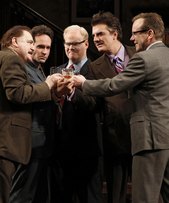SITE GUIDE
SEARCH
REVIEWS
REVIEW ARCHIVES
ADVERTISING AT CURTAINUP
FEATURES
NEWS
Etcetera and
Short Term Listings
LISTINGS
Broadway
Off-Broadway
NYC Restaurants
BOOKS and CDs
OTHER PLACES
Berkshires
London
California
New Jersey
DC
Connecticut
Philadelphia
Elsewhere
QUOTES
TKTS
PLAYWRIGHTS' ALBUMS
LETTERS TO EDITOR
FILM
LINKS
MISCELLANEOUS
Free Updates
Masthead
A CurtainUp Review
That Championship Season
By Elyse Sommer
|
. . . A toast to the 1952 Pennsylvania State High School Basketball Champions! You were a legend in your time, boys, a legend. Never forget that, never. . .I used to tell people you boys were like a fine watch. My very expensive and fine watch that kept perfect time.—Coach, toasting his "champions" 30 years after that triumphant championship season. No radicals here, hippies. One rape in four years. One felony. My streets are safe any hour, day, night.— George, who left the insurance business to reprise his triumphs in baskt ball as the home town Mayor. . . .my best memory to date, yeah, nothing matched it, nothing.—Phil, the rich boy who became even richer but feels truly buoyed only by that long ago championship season. I don't believe in trophies anymore!— Tom, whose trophy has become a bottle of booze. |

Brian Cox, Jason Patric, Jim Gaffigan, Chris Noth,Kiefer Sutherland
(Photo: Joan Marcus) |
Mounting Miller's play about a group of men celebrating the twentieth anniversary of their never forgotten season as the Pennsylvania State High School Baskeball champions was an apt choice given that this was also the company's twentieth anniversary. The launch of a new Broadway revival of a play without a woman in sight (except as mentioned in a denigrating way in the dialogue) isn't quite as apt, coming as it does during the month designated as Women's History month.
The playwright's dark view of the insular world of small town sports and the bigotry expressed by his now middle-aged "champions" has long ago lost the shock value it had for audience not yet accustomed to anything goes language. Nor have the years added luster to the dramaturgy so that it's now a curiosity, a chance to see a much lauded drama from the well-made play era that revolves around a favorite plot device: a gathering of at least four or five characters for a one night party at which relationships unravel and and climax with a top-it-all shocking revelation.
For all its awards, a well-paced production and a dynamite cast is needed for That Championship Season to enthrall a modern audience. Granted, the racial, religious and sexual bigotry of Miller's characters is hardly dead, or even limited to small towns. (Just read the daily headlines about Charlie Sheen!).
While Gregory Mosher's production fails in terms of pace to zip up the structural clunkiness, it does have a cast with plenty of box office appeal. Conflating acts two and three does little to step up the pace, but merely results in a rather odd intermission after just 35 minutes. The long post intermission scenes would have been less sluggish if the play were trimmed to 90 minutes without any intermission (Not likely to be a problem with Miller's estate since I've heard about productions done this way).
The starry ensemble that should keep the seats filled through the limited engagement includes Kiefer Sutherland of 24 and Chris Noth of Sex and the City and most recently, The Good Wife; also stand-up comic Jim Gaffigan and veteran stage and screen actor Brian Cox and, for a special piquant touch, the playwright's son Jason Patric. As someone who was at the Public Theater all those years ago when That Championship Season first introduced theater goers to the dedicated but morally challenged Coach who nudged his high school basketball team into their triumphant championship season, I find no cause for unfavorable comparison of this high profile cast to the original quintet.
Sutherland and Gaffigan, both of whom are making their Broadway stage debuts, turn in very respectable performances. Sutherland is James Daley, one of the team's two brothers who during the course of the evening's various revelations lays claim to his chance to be more than the family's caretaker. He bravely and ably digs into a role totally counter to his better known TV persona. Gaffigan, is effective as George Sikowski, the not too bright insurance man turned politician and the member of the team most under the long- term influence of the Coach. Chris Noth is a good fit for Phil Romano, whose life like Gaffigan's is regulated according to the Coach's moral compass.
As for the Coach (that's the only name he gets) himself, Brian Cox skillfully lets the man's reprehensible choice of heroes (Joe McCarthy, Father Coughlin) and hate targets (not just blacks and Jews, with swipes at his proteges' ethnic origins) overtake his initial hail-fellow-well-met camaraderie. Jason Patric, as the play's alcoholic truthteller, Tom Daley, comes close to stealing the show, especially when he tumbles down the high staircase of Michael Yeargan's wonderful wood panelled set.
Unlike the justifiably popular and uplifting 1986 film Hoosiers which also focuses on a high school basketball team in middle America (in the film the setting is Indiana), Miller's play, despite many amusing lines, is downbeat and his characters not very sympathetic. The basketball championship they celebrate each year is basically a means for creating a group portrait of men who cover up their deep-down unhappiness with memories of their short-lived super uccess. Miller's play does still make the point that youthful success is not a sure-fire signal for future success, especially if one's carefully nurtured good old days memories are built on a flawed foundation.
The epithet strewn script still has some pungent moments. Perhaps the much done dramaturgy of a long evening punctuated with gradually revealed long-building secrets, lies and betrayals would seem less overly familiar if Mr. Mosher had opted to reign in all those trips up to the bathroom (that's not to say that it wasn't common for spacious, high-ceilinged suburban and small town homes like this), the Coach's private talks with one or the other of his boys , not to mention Coach's excessively long final monologue.
That said, Jason Miller had to tell his story within the constraints of the long night's journey format. John Updike, working within the less time limited format of the novel, was able to explore the changing American zeitgeist through a flawed but more fully developed and likeable basketball player named Rabbit Angstrom from the same rural Pennsylvania area as Miller's former basketball heroes. Rabbit's first appearance between covers in 1960 preceded That Championship Season. However, Miller, despite some success as an actor and screenwriter, like his fictional basketball players, never had another super success, On the other hand, Rabbit Run spawned several highly successful sequels that saw Rabbit through four decades, and like so many Easterners, leave his birthplace for a warmer climate and his final exit from life.
The physical look of the production is on the mark-- from Michael Yeargan's grand living-room to Jane Greenwood's era-perfect costumes and Peter Kaczorowski's lighting. Ultimately this new production of a much lionized work is buoyed by a stellar cast that leaves one wishing that the more dated and disturbing references weren't so easily substituted by things headlined in the daily news.
|
That Championship Season by Jason Miller Directed by Gregory Mosher Cast: Brian Cox (Coach), Jim Gaffigan (George Sikowski), Chris Noth (Phil Romano), Jason Patric (Tom Daley) and Kiefer Sutherland (James Daley) Sets: Michael Yeargan Costumes: Jane Greenwood Lighting: Peter Kaczorowski Sound: Scott Lehrer Fight Director: Rick Sordelet Stage Manager: Jane Grey Running Time: 2 hours, including one intermission (after 35 minutes) Bernard B Jacobs Theatre 242 West 45 Street From 2/09/11; opening 3/06/11; closing 5/29/11 Reviewed by Elyse Sommer at March 3rd press preview |
|
REVIEW FEEDBACK Highlight one of the responses below and click "copy" or"CTRL+C"
Paste the highlighted text into the subject line (CTRL+ V): Feel free to add detailed comments in the body of the email. . .also the names and emails of any friends to whom you'd like us to forward a copy of this review. Visit Curtainup's Blog Annex For a feed to reviews and features as they are posted add http://curtainupnewlinks.blogspot.com to your reader Curtainup at Facebook . . . Curtainup at Twitter Subscribe to our FREE email updates: E-mail: esommer@curtainup.comesommer@curtainup.com put SUBSCRIBE CURTAINUP EMAIL UPDATE in the subject line and your full name and email address in the body of the message. If you can spare a minute, tell us how you came to CurtainUp and from what part of the country. |

Slings & Arrows-the complete set
You don't have to be a Shakespeare aficionado to love all 21 episodes of this hilarious and moving Canadian TV series about a fictional Shakespeare Company






